- Home
- Arthur Miller
The Crucible Page 10
The Crucible Read online
Page 10
HALE: Proctor, I cannot think God be provoked so grandly by such a petty cause. The jails are packed—our greatest judges sit in Salem now—and hangin’s promised. Man, we must look to cause proportionate. Were there murder done, perhaps, and never brought to light? Abomination? Some secret blasphemy that stinks to Heaven? Think on cause, man, and let you help me to discover it. For there’s your way, believe it, there is your only way, when such confusion strikes upon the world. He goes to Giles and Francis. Let you counsel among yourselves; think on your village and what may have drawn from heaven such thundering wrath upon you all. I shall pray God open up our eyes.
Hale goes out.
FRANCIS, struck by Hale’s mood: I never heard no murder done in Salem.
PROCTOR—he has been reached by Hale’s words: Leave me, Francis, leave me.
GILES, shaken: John—tell me, are we lost?
PROCTOR: Go home now, Giles. We’ll speak on it tomorrow.
GILES: Let you think on it. We’ll come early, eh?
PROCTOR: Aye. Go now, Giles.
GILES: Good night, then.
Giles Corey and Francis Nurse go out. After a moment:
MARY WARREN, in a fearful squeak of a voice: Mr. Proctor, very likely they’ll let her come home once they’re given proper evidence.
PROCTOR: You’re coming to the court with me, Mary. You will tell it in the court.
MARY WARREN: I cannot charge murder on Abigail.
PROCTOR, moving menacingly toward her: You will tell the court how that poppet come here and who stuck the needle in.
MARY WARREN: She’ll kill me for sayin’ that! Proctor continues toward her. Abby’ll charge lechery on you, Mr. Proctor!
PROCTOR, halting: She’s told you!
MARY WARREN: I have known it, sir. She’ll ruin you with it, I know she will.
PROCTOR, hesitating, and with deep hatred of himself: Good. Then her saintliness is done with. Mary backs from him. We will slide together into our pit; you will tell the court what you know.
MARY WARREN, in terror: I cannot, they’ll turn on me—
Proctor strides and catches her, and she is repeating, “I cannot, I cannot!”
PROCTOR: My wife will never die for me! I will bring your guts into your mouth but that goodness will not die for me!
MARY WARREN, struggling to escape him: I cannot do it, I cannot!
PROCTOR, grasping her by the throat as though he would strangle her: Make your peace with it! Now Hell and Heaven grapple on our backs, and all our old pretense is ripped away—make your peace! He throws her to the floor, where she sobs, “I cannot, I cannot ...” And now, half to himself, staring, and turning to the open door: Peace. It is a providence, and no great change; we are only what we always were, but naked now. He walks as though toward a great horror, facing the open sky. Aye, naked! And the wind, God’s icy wind, will blow!
And she is over and over again sobbing, “I cannot, I cannot, I cannot,” as
THE CURTAIN FALLS1
ACT THREE
The vestry room of the Salem meeting house, now serving as the anteroom of the General Court.
As the curtain rises, the room is empty, but for sunlight pouring through two high windows in the back wall. The room is solemn, even forbidding. Heavy beams jut out, boards of random widths make up the walls. At the right are two doors leading into the meeting house proper, where the court is being held. At the left another door leads outside.
There is a plain bench at the left, and another at the right. In the center a rather long meeting table, with stools and a considerable armchair snugged up to it.
Through the partitioning wall at the right we hear a prosecutor’s voice, Judge Hathorne‘s, asking a question; then a woman’s voice, Martha Corey’s, replying.
HATHORNE’S VOICE: Now, Martha Corey, there is abundant evidence in our hands to show that you have given yourself to the reading of fortunes. Do you deny it?
MARTHA COREY’S VOICE: I am innocent to a witch. I know not what a witch is.
HATHORNE’S VOICE: How do you know, then, that you are not a witch?
MARTHA COREY’S VOICE: If I were, I would know it.
HATHORNE’S VOICE: Why do you hurt these children?
MARTHA COREY’S VOICE: I do not hurt them. I scorn it!
GILES’ VOICE, roaring: I have evidence for the court!
Voices of townspeople rise in excitement.
DANFORTH’S VOICE: You will keep your seat!
GILES’ VOICE: Thomas Putnam is reaching out for land!
DANFORTH’S VOICE: Remove that man, Marshal!
GILES’ VOICE: You’re hearing lies, lies!
A roaring goes up from the people.
HATHORNE’S VOICE: Arrest him, Excellency!
GILES’ VOICE: I have evidence. Why will you not hear my evidence?
The door opens and Giles is half carried into the vestry room by Herrick. Francis Nurse enters, trailing anxiously behind Giles.
GILES: Hands off, damn you, let me go!
HERRICK: Giles, Giles!
GILES: Out of my way, Herrick! I bring evidence—
HERRICK : You cannot go in there, Giles; it’s a court!
Enter Hale from the court.
HALE: Pray be calm a moment.
GILES: You, Mr. Hale, go in there and demand I speak.
HALE: A moment, sir, a moment.
GILES: They’ll be hangin’ my wife!
Judge Hathorne enters. He is in his sixties, a bitter, remorseless Salem judge.
HATHORNE: How do you dare come roarin’ into this court! Are you gone daft, Corey?
GILES: You’re not a Boston judge yet, Hathorne. You’ll not call me daft!
Enter Deputy Governor Danforth and, behind him, Ezekiel Cheever and Parris. On his appearance, silence falls. Danforth is a grave man in his sixties, of some humor and sophistication that do not, however, interfere with an exact loyalty to his position and his cause. He comes down to Giles, who awaits his wrath.
DANFORTH, looking directly at Giles: Who is this man?
PARRIS: Giles Corey, sir, and a more contentious—
GILES, to Parris: I am asked the question, and I am old enough to answer it! To Danforth, who impresses him and to whom he smiles through his strain: My name is Corey, sir, Giles Corey. I have six hundred acres, and timber in addition. It is my wife you be condemning now. He indicates the courtroom.
DANFORTH: And how do you imagine to help her cause with such contemptuous riot? Now be gone. Your old age alone keeps you out of jail for this.
GILES, beginning to plead: They be tellin’ lies about my wife, sir, I—
DANFORTH: Do you take it upon yourself to determine what this court shall believe and what it shall set aside?
GILES: Your Excellency, we mean no disrespect for—
DANFORTH: Disrespect indeed! It is disruption, Mister. This is the highest court of the supreme government of this province, do you know it?
GILES, beginning to weep: Your Excellency, I only said she were readin’ books, sir, and they come and take her out of my house for—
DANFORTH, mystified: Books! What books?
GILES, through helpless sobs: It is my third wife, sir; I never had no wife that be so taken with books, and I thought to find the cause of it, d’y’see, but it were no witch I blamed her for. He is openly weeping. I have broke charity with the woman, I have broke charity with her. He covers his face, ashamed. Danforth is respectfully silent.
HALE: Excellency, he claims hard evidence for his wife’s defense. I think that in all justice you must—
DANFORTH: Then let him submit his evidence in proper affidavit. You are certainly aware of our procedure here, Mr. Hale. To Herrick: Clear this room.
HERRICK: Come now, Giles. He gently pushes Corey out.
FRANCIS: We are desperate, sir; we come here three days now and cannot be heard.
DANFORTH: Who is this man?
FRANCIS: Francis Nurse, Your Excellency.
HALE:
His wife’s Rebecca that were condemned this morning.
DANFORTH: Indeed! I am amazed to find you in such uproar. I have only good report of your character, Mr. Nurse.
HATHORNE: I think they must both be arrested in contempt, sir.
DANFORTH, to Francis: Let you write your plea, and in due time I will—
FRANCIS: Excellency, we have proof for your eyes; God forbid you shut them to it. The girls, sir, the girls are frauds.
DANFORTH: What’s that?
FRANCIS: We have proof of it, sir. They are all deceiving you.
Danforth is shocked, but studying Francis.
HATHORNE: This is contempt, sir, contempt!
DANFORTH: Peace, Judge Hathorne. Do you know who I am, Mr. Nurse?
FRANCIS: I surely do, sir, and I think you must be a wise judge to be what you are.
DANFORTH: And do you know that near to four hundred are in the jails from Marblehead to Lynn, and upon my signature?
FRANCIS: I—
DANFORTH: And seventy-two condemned to hang by that signature?
FRANCIS: Excellency, I never thought to say it to such a weighty judge, but you are deceived.
Enter Giles Corey from left. All turn to see as he beckons in Mary Warren with Proctor. Mary is keeping her eyes to the ground; Proctor has her elbow as though she were near collapse.
PARRIS, on seeing her, in shock: Mary Warren! He goes directly to bend close to her face. What are you about here?
PROCTOR, pressing Parris away from her with a gentle but firm motion of protectiveness: She would speak with the Deputy Governor.
DANFORTH, shocked by this, turns to Herrick: Did you not tell me Mary Warren were sick in bed?
HERRICK: She were, Your Honor. When I go to fetch her to the court last week, she said she were sick.
GILES: She has been strivin’ with her soul all week, Your Honor; she comes now to tell the truth of this to you.
DANFORTH: Who is this?
PROCTOR: John Proctor, sir. Elizabeth Proctor is my wife.
PARRIS: Beware this man, Your Excellency, this man is mischief.
HALE, excitedly: I think you must hear the girl, sir, she—
DANFORTH, who has become very interested in Mary Warren and only raises a hand toward Hale: Peace. What would you tell us, Mary Warren?
Proctor looks at her, but she cannot speak.
PROCTOR: She never saw no spirits, sir.
DANFORTH, with great alarm and surprise, to Mary: Never saw rio spirits!
GILES, eagerly: Never.
PROCTOR, reaching into his jacket: She has signed a deposition, sir—
DANFORTH, instantly: No, no, I accept no depositions. He is rapidly calculating this; he turns from her to Proctor. Tell me, Mr. Proctor, have you given out this story in the village?
PROCTOR: We have not.
PARRIS: They’ve come to overthrow the court, sir! This man is—
DANFORTH: I pray you, Mr. Parris. Do you know, Mr. Proctor, that the entire contention of the state in these trials is that the voice of Heaven is speaking through the children?
PROCTOR: I know that, sir.
DANFORTH, thinks, staring at Proctor, then turns to Mary Warren: And you, Mary Warren, how came you to cry out people for sending their spirits against you?
MARY WARREN: It were pretense, sir.
DANFORTH: I cannot hear you.
PROCTOR: It were pretense, she says.
DANFORTH: Ah? And the other girls? Susanna Walcott, and—the others? They are also pretending?
MARY WARREN: Aye, sir.
DANFORTH, wide-eyed: Indeed. Pause. He is baffled by this. He turns to study Proctor’s face.
PARRIS, in a sweat: Excellency, you surely cannot think to let so vile a lie be spread in open court!
DANFORTH: Indeed not, but it strike hard upon me that she will dare come here with such a tale. Now, Mr. Proctor, before I decide whether I shall hear you or not, it is my duty to tell you this. We burn a hot fire here; it melts down all concealment.
PROCTOR: I know that, sir.
DANFORTH: Let me continue. I understand well, a husband’s tenderness may drive him to extravagance in defense of a wife. Are you certain in your conscience, Mister, that your evidence is the truth?
PROCTOR: It is. And you will surely know it.
DANFORTH: And you thought to declare this revelation in the open court before the public?
PROCTOR: I thought I would, aye—with your permission.
DANFORTH, his eyes narrowing: Now, sir, what is your purpose in so doing?
PROCTOR: Why, I—I would free my wife, sir.
DANFORTH: There lurks nowhere in your heart, nor hidden in your spirit, any desire to undermine this court?
PROCTOR, with the faintest faltering: Why, no, sir.
CHEEVER, clears his throat, awakening: I—Your Excellency.
DANFORTH: Mr. Cheever.
CHEEVER: I think it be my duty, sir—Kindly, to Proctor: You’ll not deny it, John. To Danforth: When we come to take his wife, he damned the court and ripped your warrant.
PARRIS: Now you have it!
DANFORTH: He did that, Mr. Hale?
HALE, takes a breath: Aye, he did.
PROCTOR: It were a temper, sir. I knew not what I did.
DANFORTH, studying him: Mr. Proctor.
PROCTOR: Aye, sir.
DANFORTH, straight into his eyes: Have you ever seen the Devil?
PROCTOR: No, sir.
DANFORTH: You are in all respects a Gospel Christian?
PROCTOR: I am, sir.
PARRIS: Such a Christian that will not come to church but once in a month!
DANFORTH, restrained—he is curious: Not come to church?
PROCTOR: I—I have no love for Mr. Parris. It is no secret. But God I surely love.
CHEEVER: He plow on Sunday, sir.
DANFORTH: Plow on Sunday!
CHEEVER, apologetically: I think it be evidence, John. I am an official of the court, I cannot keep it.
PROCTOR: I—I have once or twice plowed on Sunday. I have three children, sir, and until last year my land give little.
GILES: You’ll find other Christians that do plow on Sunday if the truth be known.
HALE: Your Honor, I cannot think you may judge the man on such evidence.
DANFORTH: I judge nothing. Pause. He keeps watching Proctor, who tries to meet his gaze. I tell you straight, Mister—I have seen marvels in this court. I have seen people choked before my eyes by spirits; I have seen them stuck by pins and slashed by daggers. I have until this moment not the slightest reason to suspect that the children may be deceiving me. Do you understand my meaning?
PROCTOR: Excellency, does it not strike upon you that so many of these women have lived so long with such upright reputation, and—
PARRIS: Do you read the Gospel, Mr. Proctor?
PROCTOR: I read the Gospel.
PARRIS: I think not, or you should surely know that Cain were an upright man, and yet he did kill Abel.
PROCTOR: Aye, God tells us that. To Danforth: But who tells us Rebecca Nurse murdered seven babies by sending out her spirit on them? It is the children only, and this one will swear she lied to you.
Danforth considers, then beckons Hathorne to him. Hathorne leans in, and he speaks in his ear. Hathorne nods.
HATHORNE: Aye, she’s the one.
DANFORTH: Mr. Proctor, this morning, your wife send me a claim in which she states that she is pregnant now.
PROCTOR: My wife pregnant!
DANFORTH: There be no sign of it—we have examined her body.
PROCTOR: But if she say she is pregnant, then she must be! That woman will never lie, Mr. Danforth.
DANFORTH: She will not?
PROCTOR: Never, sir, never.
DANFORTH: We have thought it too convenient to be credited. However, if I should tell you now that I will let her be kept another month; and if she begin to show her natural signs, you shall have her living yet another year until she is delivered—w
hat say you to that? John Proctor is struck silent. Come now. You say your only purpose is to save your wife. Good, then, she is saved at least this year, and a year is long. What say you, sir? It is done now. In conflict, Proctor glances at Francis and Giles. Will you drop this charge?
PROCTOR: I—I think I cannot.
DANFORTH, now an almost imperceptible hardness in his voice: Then your purpose is somewhat larger.
PARRIS: He’s come to overthrow this court, Your Honor!
PROCTOR: These are my friends. Their wives are also accused—
DANFORTH, with a sudden briskness of manner: I judge you not, sir. I am ready to hear your evidence.
PROCTOR: I come not to hurt the court; I only—
DANFORTH, cutting him off: Marshal, go into the court and bid Judge Stoughton and Judge Sewall declare recess for one hour. And let them go to the tavern, if they will. All witnesses and prisoners are to be kept in the building.
HERRICK: Aye, sir. Very deferentially: If I may say it, sir, I know this man all my life. It is a good man, sir.
DANFORTH—it is the reflection on himself he resents: I am sure of it, Marshal. Herrick nods, then goes out. Now, what deposition do you have for us, Mr. Proctor? And I beg you be clear, open as the sky, and honest.
PROCTOR, as he takes out several papers: I am no lawyer, so I’ll—
DANFORTH: The pure in heart need no lawyers. Proceed as you will.
PROCTOR, handing Danforth a paper: Will you read this first, sir? It’s a sort of testament. The people signing it declare their good opinion of Rebecca, and my wife, and Martha Corey. Danforth looks down at the paper.
PARRIS, to enlist Danforth’s sarcasm: Their good opinion! But Danforth goes on reading, and Proctor is heartened.
PROCTOR: These are all landholding farmers, members of the church. Delicately, trying to point out a paragraph: If you’ll notice, sir—they’ve known the women many years and never saw no sign they had dealings with the Devil.
Parris nervously moves over and reads over Danforth’s shoulder.
DANFORTH, glancing down a long list: How many names are here?
FRANCIS: Ninety-one, Your Excellency.
PARRIS, sweating: These people should be summoned. Danforth looks up at him questioningly. For questioning.
FRANCIS, trembling with anger: Mr. Danforth, I gave them all my word no harm would come to them for signing this.

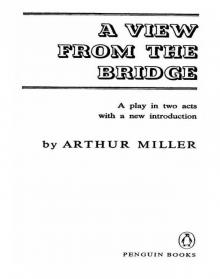 A View From the Bridge: A Play in Two Acts
A View From the Bridge: A Play in Two Acts Broken Glass
Broken Glass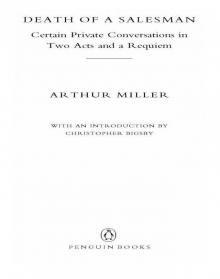 Death of a Salesman
Death of a Salesman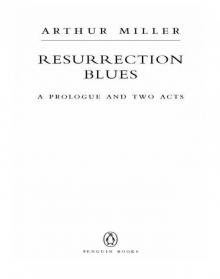 Resurrection Blues
Resurrection Blues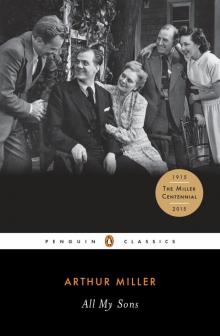 All My Sons
All My Sons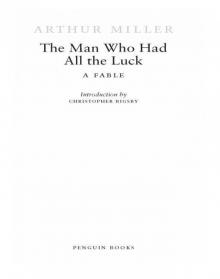 The Man Who Had All the Luck
The Man Who Had All the Luck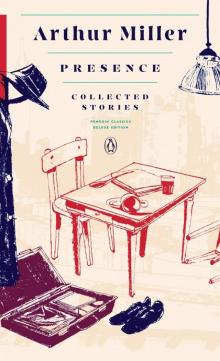 Presence: Stories
Presence: Stories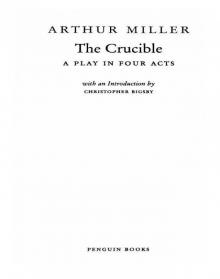 The Crucible
The Crucible Collected Essays
Collected Essays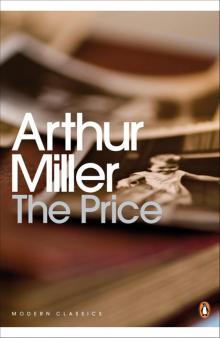 The Price
The Price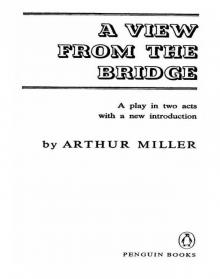 A View from the Bridge
A View from the Bridge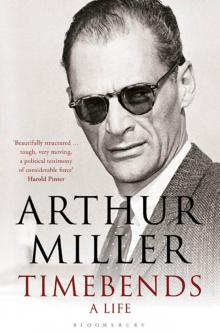 Timebends
Timebends The Penguin Arthur Miller
The Penguin Arthur Miller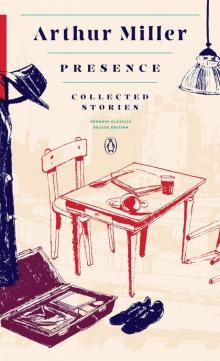 Presence
Presence